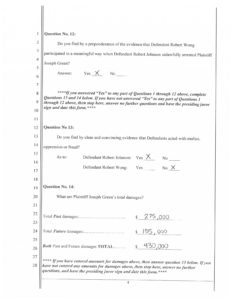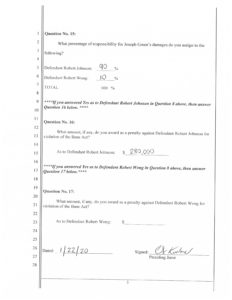Trial Lawyer From Scottsdale Injury Lawyers Obtains $710,000 Jury Verdict in Civil Rights Case Alleging Police Excessive Force
Trial Lawyer From Scottsdale Injury Lawyers Obtains $710,000 Jury Verdict in Civil Rights Case Alleging Police Excessive Force
Exactly ten days ago, C. Tony Piccuta from Scottsdale Injury Lawyers scored a major victory in a police excessive force case. The civil rights and personal injury lawyer won a civil rights case for police misconduct. The jury awarded his client $710,000 for an incident that arose in 2011. The incident involved an attack by a police officer that left Piccuta’s client without his top two front teeth and a split lower lip requiring stitches to repair. The client was sixteen-years-old at the time and twenty-five at the time of trial.


The Money Awarded in the Civil Rights Trial
The jury awarded the client a total of $275,000 for past pain and suffering and $155,000 for future pain and suffering. The total amount awarded for pain and suffering equaled $430,000. The jury also awarded $280,000 to the firm’s client as a penalty for what the primary officer did. The amount of the jury verdict combined equaled $710,000.
Because Piccuta prevailed on the civil rights claims, he is entitled to an award of attorney fees and costs. A request for costs in the amount of approximately $25,000 will be filed. In addition, Piccuta will be moving the court to award attorney fees which are in excess of half a million dollars. After the jury reached its verdict, Piccuta reached a settlement agreement with the other side with respect to paying the full verdict amount of $710,000 in sixty days.
There Will Be No Appeals and the Client Will Receive the Money He Deserves
The jury found that the primary officer in the beating acted with “malice, oppression or fraud.” As a result, in addition to the $710,000 awarded, Piccuta and the client had the right to pursue punitive damages against the officer. Punitive damages are essentially punishment damages. The purpose of punitive damages is to punish a wrongdoer for the conduct that harmed the plaintiff and to discourage similar conduct in the future.
Several factors determine the amount of punitive damages that may be awarded. These factors include:
-
- How disgraceful was the Defendant’s conduct?
- Is there a reasonable relationship between the amount of punitive damages and the client’s harm?
- The financial condition of the defendant.
In determining how disgraceful one’s conduct is, a jury may consider the following:
- Whether the conduct caused physical harm.
- Whether the defendant disregarded the health or safety of others.
- Whether the client was especially vulnerable.
- Whether defendant’s conduct involved a pattern or practice.
- Whether defendant acted with trickery or deceit.
After the jury entered its verdict, the Court ordered the officer to turn over his financial information. This included: bank account balances, paycheck stubs, vehicle ownership information, information on property holdings, retirement accounts balances, etc. Piccuta and his client then had the opportunity to put on new evidence for another phase of the trial regarding the punitive damages. Specifically, Piccuta and his client had the right to put into evidence the officer’s other misconduct, including past incidents of excessive force, as well as his financial ability to pay a punitive damages award. After reviewing this information, Piccuta determined that the officer was in a weak financial position and that the jury was unlikely to award a large amount for punitive damages.
Piccuta then negotiated a settlement agreement in the courtroom with the defense attorneys. Piccuta and the client agreed to waive punitive damages, in exchange for full payment of the $710,000 verdict in sixty days. This was especially important because the City that employed the officer had previously filed for bankruptcy and a question existed as to whether or not the verdict was subject to the bankruptcy. If it was, the client would only be paid pennies on the dollar. As part of the deal, defendants also agreed to waive all challenges to the verdict and appeal rights. Piccuta and the client also negotiated the right to move for attorney fees and recover costs.
Serious Arizona Trial Lawyers Who Are Not Afraid to Take the Case to Trial
What makes this result particularly satisfying for Piccuta and his client was the fact that it almost never happened. The client had originally hired a different attorney to handle the case. The previous attorney did not work the case up properly. He did very little to dig into the evidence. He did not pressure the other side. He basically prepared the case to settle, not to be tried to a jury.
Of course, the client had no idea this was happening as the case was pending. Like most clients, he had no idea what his attorney was or was not doing. The client did not discover this until he went to a mediation with his attorney. A mediation is a meeting with both sides and a third-party mediator. The mediator acts as a middle-man and attempts to get the parties to settle. At the mediation, the police officer defendants, and the City who they worked for, offered the client $37,500 to settle the case.
Piccuta is no trial coward and was willing to go to war and win the case. That is exactly what he did and what happened.
The client’s previous attorney tried to pressure the client to settle his case for this low-ball amount. When the client refused, the attorney told the client he would not take the case to trial and that he needed to find a different attorney. According to the client, the attorney then refused to talk to him for the remainder of the mediation and turned his back to the client and stared out the window. Not long after, the client found Piccuta who agreed to take his case. Piccuta is no trial coward and was willing to go to war and win the case. That is exactly what he did and what happened.
The Settlement Discussions Leading Up to the Case
After Piccuta entered the case, he started working it aggressively. He defeated several defense motions. He took sworn statements and he fought for documents that the other side was withholding. Just prior to trial, the parties were supposed to participate in a settlement conference. The defense attorneys told Piccuta that there would be no offer over six figures. Apparently, those attorneys thought that they could settle cheap because of how the previous attorney had handled the case. Piccuta told them there was no need for the settlement conference and that he would rather spend his time preparing for trial.
Piccuta told the defense attorneys that they should agree to vacate the settlement conference. They agreed and the settlement conference was vacated. Piccuta also told the defense attorneys that the case would end badly for their clients.
The attorney then told Piccuta that the defendants would pay $100,000 to settle the case. Piccuta told him to add a zero and that he would see them on the first day of trial to select a jury.
Just prior to trial, the defense attorney representing the main police officer and the City contacted Piccuta and told him that he had authority to settle the case. The attorney said he would not hold anything back or try to negotiate because the trial was so close. The attorney then told Piccuta that the defendants would pay $100,000 to settle the case. Piccuta told him to add a zero and that he would see them on the first day of trial to select a jury.
A Defense Attorney’s Worst Nightmare
A defense attorney’s worst nightmare is hearing the jury foreman read back the jury verdict in favor of Plaintiff. This is made even worse when the verdict is seven to ten times what the defense offered as their top settlement. It essentially means that the defendants and their attorneys were destroyed at trial. Pictured below is the actual verdict from the case:
This held true in this case. When the jury read back the verdict, it was seven times the highest offer ever made to settle the case. After attorney fees are awarded and added, the result will be somewhere in the range of twelve to fifteen times the highest settlement offer.
The Most Satisfying Moment for A Trial Lawyer Is Sharing the Victory With His Client
It is impossible to try a case without becoming intimately familiar with the client. By the time a civil rights case or serious personal injury case is tried, a trial lawyer has spent hours upon hours with the client. Over the better part of the two or more years it takes to get a case to trial, the attorney will have had meetings, conversations and made appearances in court with the client. Leading up to trial, the attorney will have spent hours preparing his client. During the trial, the attorney will be with the client day in and day out. This held true with this case, as the trial alone lasted the better part of three weeks.
No great trial victory is ever obtained without a great personal sacrifice made by both the attorney and the client.
No great trial victory is ever obtained without a great personal sacrifice made by both the attorney and the client. Here, Piccuta was away from his family and four-year-old son for three consecutive weeks. He routinely worked trial days that stared at 5:00 AM and ended at midnight. Of course, the other cases he handled did not stop during that time and needed to be tended to as well.

The client makes a great personal commitment and sacrifice as well. In this case, the client’s life was uprooted. He and his mother attended trial every day. Neither worked during that period and made a great financial sacrifice. More importantly, the client had to be willing to tell his story to strangers and expose his life. He was forced to give details that no one else knew such as the effect of the event on his mental health. He had to tell twelve strangers how he became depressed, started having a recurring nightmare of the officer chasing him that caused him to wet his bed and still suffered from PTSD. He had to address the defense team’s dirty tactics and questioning into each and every personal misstep he had in his life. In this case, the defense went so far as to try to question the client about disciplinary problems he had in elementary school.
In a civil rights case for police excessive force, the result is not just for the client. It is for the entire community. It signifies that an individual is willing to stand up and take a police officer to task who has abused his authority.
It takes courage to do what the client did. He had to risk a settlement of $100,000 in the hopes that a jury would see the truth. In a civil rights case for police excessive force, the result is not just for the client. It is for the entire community. It signifies that an individual is willing to stand up and take a police officer to task who has abused his authority. It is a check on the power given to police officers and it protects the community at large from continued police misconduct. It sends a message to bad police officers. That message is “You are not above the law and if you act improperly, you will be publicly held accountable in a court of law.”
When the trial was over, the client told Piccuta not all superheroes wear capes.
The more difficult the road, the more satisfying it is when the verdict is read. After the client testified at trial, he told Piccuta that he felt like a million bricks had been lifted off his shoulders. When the trial was over, the client told Piccuta “not all superheroes wear capes.” The client also thanked Piccuta for all the work he did and the client told Piccuta “if it wasn’t for you, this guy would have gotten away with this.” The result for the client will be life-changing. More importantly, it delivers closure to him and delivers justice.
The Civil Rights Case For Police Excessive Force
If you want to know more about the case, you can read the blog post from last month. To summarize, the case was about a sixteen-year-old who talked back to a police officer in a convenient store in 2011. After the teenager talked back to the officer, the officer lost his temper. As the teenager was exiting the store, the officer grabbed him from behind and pulled him back in. Once they were back in the store, the police officer slammed him to the ground and started punching him in the face. The officer’s partner came over as this was happening to assist. The partner did not stop the officer or intervene.
After the teenager was handcuffed, with his hands behind his back, the officer picked up the back of his head and slammed his face into the floor. The police officer did this for no reason and when the teenager was defenseless. At no, time did the teenager resist arrest or do anything that could be construed as aggressive. As a result of the attack, the client lost his two front teeth, chipped a third tooth and had his bottom lip split open. Neither officer called for an ambulance and they did not take him to the hospital immediately as their training dictated. Instead, they took him to the station, photographed his injuries and cited him for trespassing and resisting arrest. Because his teeth were not properly preserved and too much time passed, they could not be reinserted.
There was surveillance at the convenient store that captured the events. The surveillance showed that the officer staged evidence at the scene to support his version of what happened. Specifically, he took hand held shopping baskets out of a rack by a shelf, placed them in the middle of the aisle and claimed he and the teenager were struggling and accidentally tripped over them. The officer would write in his police report that the teenager fell face first after this “accidental trip” which caused him to lose his teeth. The officer did not include in his police report that he smashed the teenager’s face into the floor while he was handcuffed.
This High-Profile Civil Rights Case Was Closely Followed By the Media
Several media outlets followed the trial and attended it daily. Several stories were published throughout the trial. Piccuta was regularly interviewed by the media. Multiple media outlets published stories about the final result. Click the below links to read stories about the trial and verdict.
Story about the verdict published by KQED.
Story about the verdict published by the Record.
Story about the verdict published by the Vanguard.
Contact A Proven Civil Rights and Personal Injury Trial Lawyer
If you or a loved one has experienced something and need the help of skilled trial lawyer, contact Scottsdale Injury Lawyers today. A proven trial attorney is available now. Scottsdale Injury Lawyers specializes in serious personal injury cases and civil rights cases involving police misconduct.
All cases are taken on a contingent fee. This means that you do not pay anything unless there is a recovery for you. The firm advances all costs and you do not owe anything if you lose your case. Call today to discuss your case. A consultation is free of charge.



